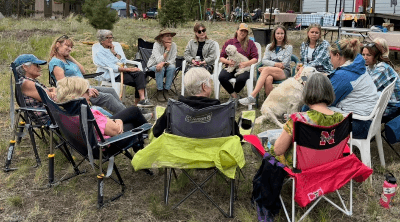My Cochlear Implant Journey (Part 3): Group Conversations - My Biggest Challenge
My Cochlear Implant Journey (Part 3): Group Conversations - My Biggest Challenge
By Julie Hayes-Nadler

In my last two post, I talked about my relatively fast adaptation to hearing through my cochlear implant and also shared the reality that the implant does not solve all my hearing challenges. As for most people with varying degrees of hearing loss, groups can be the biggest challenge. Family life also presents it’s own measure of challenge but also many deep rewards! I reflect on these aspects of my experience here along with some thoughts on how I am finding my way back into the experience of music along with sense of community.
Group Conversations: One of My Biggest Challenges
With a cochlear implant, group conversations are where things often fall apart fastest. If people are speaking one at a time and I’m close enough, I can keep up. But when the conversation pings quickly from one person to the next, I often lose track. My processor only picks up sound from my right side, and I’ve lost the ability to localize where sounds are coming from. By the time I figure out whose talking and turn toward the moving lips, the topic may have already shifted.
When that happens, I must admit that I sometimes default to “faking it”; smiling, nodding, and mirroring expressions, even though I’m lost. It’s isolating because I’m not truly participating; I’m performing.
On my brave days, especially with people I know well and increasingly with those I don’t, I speak up. I’ll ask for one person to talk at a time, for better lighting, or for us to move somewhere quieter. This almost always works as most people genuinely want to help. But with strangers or in fast-paced moments, I sometimes shrink back. I regret those lost opportunities. I’ve learned my best bet is to advocate up front, before the conversation derails.
Home Life and Shared Effort
At home, my family is learning too. They try to face me when they speak, but old habits die hard. Asking for a repeat once is fine; twice or three times can feel humiliating. The ease of communication we once had is often not there, but our commitment to each other is strong and we are finding our way with love and patience and the shared value of staying closely connected. It works best when we show up as equal communication partners, each of us doing our parts.
My husband’s proficiency with sign language has been an incredible support and when I don’t have my processor on or even when I do and spoken language is becoming too challenging he gracefully adds sign as another puzzle piece to aid in our shared communication effort. We are truly in this together.
The Sound of Music (and other surprises)
One thing I didn’t expect is how distorted certain sounds can be when processed through my bionic ear. TV or voices in another room are so warped that I often just turn my implant processor off if I’m not directly involved in the conversation. Even when focused on watching tv I still very much need closed captions to fully understand the dialogue.
Sadly, music is most often a disappointing, messy thing now. If I already know the song well, my brain can piece it together. It doesn’t have the sound quality I remember and loved and truthfully it rarely if ever sounds good but it is somewhat accessible and for that I am grateful.
Unfortunately unfamiliar music is totally lost on me. My brain just doesn’t seem to want to process it. Even music I know can sound tinny, piercing, or like everything is coming through a tunnel or a really horrible sound system. Strangely, I enjoy music more when I use my ASL to sign the words while listening. I think it must engage a different part of my brain and distracts me from the distortion in what I’m hearing. This is where I can find some joy in the songs I have known and loved in the past. There’s no guarantee music will ever sound the way it used to, but I keep listening in hopes my brain will adapt, just as it did with speech.
So far my best tool for improving my experience of music has been to go back and sing with my community song circle. There I feel a sense of community along with a connection to the meaning behind the words in the simple songs we sing. I have an angel of a friend who stays close to help me if I feel lost. I have had to get more comfortable with how vulnerable I feel singing publicly but the reward I reap by participating in community song is so great that I’m willing to join in. There is something about my participation in the familiarity of this music that makes it sound more “normal” and gives me hope. In the end I believe community song circle may be my path back to once again enjoying the sound of music!
I often get asked is if I’m glad I went through with getting a cochlear implant. In my final post next month I’ll give my honest answer. I hope you’ll join me there as I wrap up my reflections on my first 10 months of my cochlear implant journey!